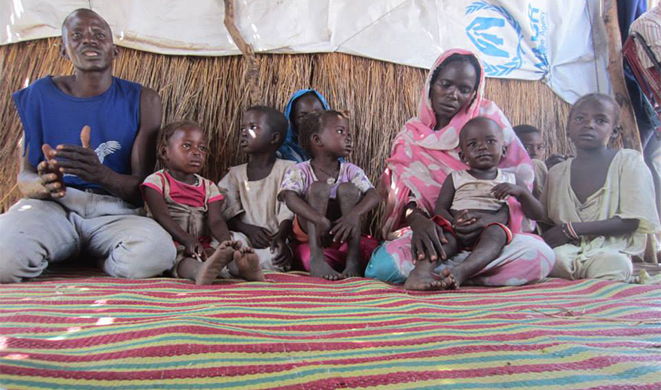Editor's Note: Meghan, the Darfur Dream Team Sister Schools Program Associate, has been visiting the Djabal and Goz Amer refugee camps. She shares her experiences during visits with students and families living in the camps.
I am currently in Kou Kou Angarana, Chad which is less than 30 miles from the Chad-Sudan border. I’ve been in this area for almost two weeks visiting Djabal and Goz Amer refugee camps for the Enough Project’s Darfur Dream Team Sister Schools Program, or DDT, and have just a few days remaining in my trip. When I return, I plan to share more about DDT developments and what I’ve learned meeting with students, parents, teachers, and UN Refugee Agency, or UNHCR, and partner organization staff. But first, I wanted to share a story from my visit to Goz Amer refugee camp yesterday.
Yesterday was tough.
I've met survivors of the violence in Darfur before. I've heard refugees tell their stories of escape, survival on the margins, and challenges in refugee and IDP camps. However, most of the time, I've interacted with individuals years after the events that forced them to leave their homes. But yesterday was different. I met with some of the newest victims of violence and refugees from Darfur, including Ibrahim and his family, some of whom are pictured below.

Ibrahim Mohammed Yacoub, a farmer, barber, and father of 12, was composed for most of our interview, telling me about how the town they lived in, Um Dukhun, had seen some violence in the last decade, but was largely untouched by the genocide in Darfur—until this year. He spoke calmly of the increasing violence and events that lead them to decide to leave the only home their children had ever known. These events included the expansion of militia groups divided along tribal lines, many supposedly supported by various members of the Government of Sudan, nighttime attacks indiscriminately against suspected militia and civilians alike, daytime violence in the streets, and more. He felt that it was only a matter of time before he or a member of his family fell victim to the growing violence. In the early morning hours of a day in April, he left Um Dukhun with his two wives and 12 children. His mother, who is in her 60s, chose to remain at home because the arduous five-day walk from Um Dukhun to the Sudan-Chad border would be too rough for her.
It wasn't until I asked what had become of his home that Ibrahim became upset. He explained that he received word that his house and those of many of his neighbors had been burned by militias, that some of his neighbors had been killed, and that he still did not know the fate of his mother. At this point in the discussion, Ibrahim was overcome by emotion and I said that we could stop the interview, but he asked that we continue. He asked that I return to the U.S. and remind our citizens, government, and especially President Obama that the Darfur conflict is not over, the government-supported militias are not gone, and, if anything, there is a resurgence of violence which that the daily attacks at Um Dukhun and throughout Darfur confirm. He pleaded to international community to try harder to find ways to support peace in Sudan, lest his family and the millions of other displaced Darfuris spend the next decade in a refugee or IDP camp. He asked that we don't forget Darfur.
As I write this, the violence continues in Darfur and throughout Sudan and organizations along the border here in Chad are preparing for an influx of even more refugees with the end of the rainy season. Yesterday was tough, but it was a good reminder of why we in the anti-Genocide community must keep doing what we’re doing and work to find ways to be louder, quicker, and more effective than ever before.
To follow the rest of the trip and see more photos from Djabal and Goz Amer refugee camps, visit the Darfur Dream Team Facebook page.
Photo: Ibrahim Mohammed Yaboub with 8 of his 14 family members who made the jouney with him from Um Dukhun to Goz Amer refugee camp: Mahdiniya (4), Mukhtar (6), Mufida (10), Mahida (4), his wife- Aleema, Nasir (2), Mahway (9), and Zohar (8). (Darfur Dream Team)

